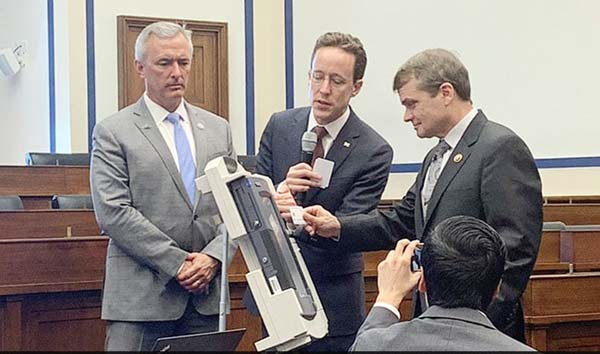
At a Boston technology conference last month, computer scientist Alex Halderman showed how easy it was to hack into an electronic voting machine and change the result, without leaving a trace.
Halderman staged a mock election in which three conference attendees voted for George Washington, but an infected memory card switched the result to give a 2-1 victory to Benedict Arnold, the military officer who sold secrets during the Revolutionary War.
Halderman’s demonstration was on a voting machine still in use in 20 US states, which had no paper ballots that could be compared to the electronic output, and thus no way to determine if vote totals had been altered.
“What keeps me up at night is the threat that a hostile nation-state could probe every swing state or swing district (and) find the ones most weakly protected, to silently change the results of a national election,” the University of Michigan professor said.
A month ahead of the midterm congressional elections, security experts say the risks remain high for a hack on voting machines or other targets.
The vote comes two years after the US national election in which, according to intelligence officials, Russian agents probed voter registration networks in at least 20 states and accessed at least one.
Halderman said the Russians had the ability to destroy or alter voting records, which could have led to chaos on election day. He added however that, according to a Senate Intelligence Committee investigation, “they did not pull the trigger on that ability.”
Other researchers have shown flaws which could allow hackers to penetrate voting machines or networks, and have stepped up calls for new methods to replace all-electronic systems with no paper backup, still in use for an estimated 20 to 25 percent of US voters.
The Defcon conference of security researchers discovered a voting tabulator used in 23 states is vulnerable to a remote hack via a network attack and another machine used in 18 states could be hacked within two minutes.
A National Academy of Science report in September recommended that every effort should be made to use paper ballots in the 2018 election and that by 2020 “human readable” ballots should be standard.
States should mandate audits prior to the certification of election results, it said, getting enough data to ensure that any electronic totals match the ones on paper.
US elections are managed by state and local officials, meaning standards may not be uniform, and some states have resisted efforts to impose norms, claiming this would impinge on their authority.
In Georgia, a judge declined to order the replacement of electronic voting machines for the November 6 vote because it was too late, but warned that voters may have a case that their constitutional rights were violated.
Five states still use “paperless” systems without any form of backup, according to Joseph Hall, who heads an election security research team at the Center for Democracy and Technology.
Hall said that in addition to voting machines and election rolls, hackers may look at other targets such as candidates, or the networks of state or local officials who run the elections.
“We are increasingly worried about adversaries attacking the election system,” Hall said.

